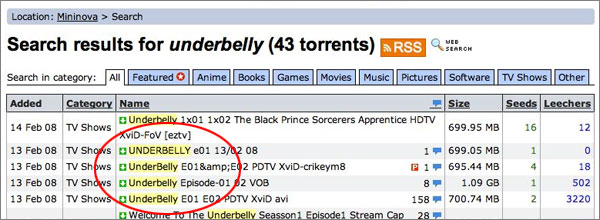Last night Channel Nine screened the crime drama Underbelly everywhere across Australia — except Victoria, where it was banned following a Supreme Court order. But thanks to the joys of BitTorrent, thousands of people have already downloaded it from the Internet. The law cannot cope in this new era.
As the screenshot shows, Underbelly was online within two hours of broadcast. By mid-morning today, 6500+ people had downloaded it from Mininova alone.

As with the Corey Delaney episode before it, this highlights the stupidity of the law in the bold new age of the Internet. I have no complaint with Justice Betty King’s decision. She’s just upholding the law as it stands. The law, alas, is hopelessly inadequate.
Who, I wonder, has this kind of law reform on their agenda. Anyone?
Bonus links:
- My article for Crikey today: A torrent of interest in downloading Underbelly
- Mark Pesce’s presentation Unevenly Distributed: Production Models for the 21st Century, which includes a detailed discussion of how new distribution models like BitTorrent will change TV forever.



